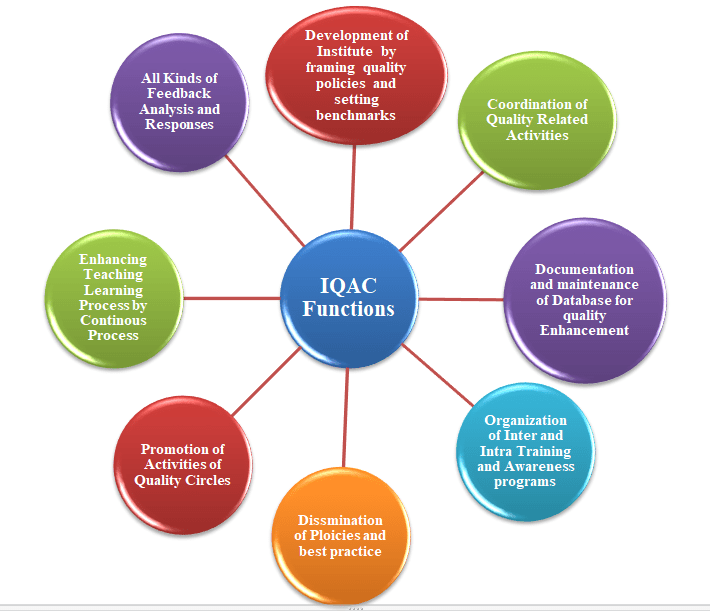Internal Quality Assurance Cell (IQAC)
The composition of Internal Quality Assurance Cell (IQAC) committee of Rajeev Institute of Technology:
Members
| Sl. No. | Name | Designation & Department | Composition | Position |
| 1 | Dr. Mahesh P K | Principal, RIT | Head of the Institution | Chairperson |
| 2 | Dr. Rathna B N | Secretary, RIT | Management Representative | Member |
| 3 | Mr. Gopal Krishna | Office Superintendent (OS) | Senior Administrative Officers | Member |
| 4 | Mrs. Supriya C L | Asst. Prof, Dept. of CV | Faculty of RIT | Member |
| 5 | Mrs. Vani A | Asst. Prof, Dept. of CV | Member | |
| 6 | Dr. Sharath M N | Assoc. Prof, Dept. of ISE | Member | |
| 7 | Mr. Vasanth Kumar G | Asst. Prof, Dept. of EEE | Member | |
| 8 | Mr. Vinay L | Asst. Prof, Dept. of ME | Member | |
| 9 | Mr. Vishwanath B R | Asst. Prof, Dept. of ECE | Member | |
| 10 | Mr. Anil Kumar | Asst. Prof, Dept. of ISE | Member | |
| 11 | Mr. Vijay Kumar Yadhav | Asst. Prof, Dept. of ISE | ||
| 12 | Mr. Visweswaran. J | Territory Manager, Country Manager-HE, ARK Info, India | Industry Representative | Member |
| 13 | Mr. Abhishek Pruthvi | 4RA14IS001 | Alumni | Member |
| 14 | Ms. Tejas S S | 4RA20IS026 | Student Representative | Member |
| 15 | Dr. Rammurthy D | Assoc. Prof, Dept. of ECE | Coordinator | Member Secretary |
Roles and Responsibilities
- Chairperson: Providing overall guidance and support to the IQAC committee and ensuring that the recommendations of the IQAC committee are implemented.
- Convenor/Coordinator: Overall coordination of the IQAC committee, preparation of the annual quality assurance report, and liaison with external quality assurance agencies.
- Faculty Members: Providing guidance and support to departments and programs, developing strategies to improve academic quality, and developing appropriate mechanisms for student feedback.
- Administrative Staff: Providing administrative support to the IQAC committee, maintaining the database of academic and administrative activities, and organizing training programs for faculty and staff.
- Student Representatives: Providing feedback on academic and administrative matters, representing student perspectives, and collaborating with faculty and staff in the development of appropriate mechanisms for student feedback.
Plan of Action
- Conducting a review of the academic programs and services provided by the institution.
- Developing a mechanism for student feedback and suggestions for improvement.
- Conducting faculty development programs on teaching methodologies and assessment practices.
- Conducting seminars and workshops on various aspects of quality assurance.
- Developing a mechanism for monitoring and evaluation of the institution’s academic and administrative activities.
Monitoring and Evaluation
- Developing appropriate tools and indicators to monitor and evaluate the quality of education and other activities of the institution.
- Conducting regular feedback from stakeholders, including students, faculty, staff, and external stakeholders.
- Analyzing the feedback and using it to develop appropriate strategies for improvement.
- Preparing an annual quality assurance report and submitting it to the management of the institution and external quality assurance agencies.
This IQAC committee can develop a structure for internal quality assurance that involves all stakeholders and promotes continuous improvement of the institution.
IQAC FUNCTIONAL DIAGRAM

Term of Members
- The tenure of Office of the Members of IQAC shall be for Three Years and may be extended by the Chairperson.
- IQAC shall meet at least Two Times a year on dates, times and places decided by the Chairperson.
- The Agenda for IQAC meetings shall be prepared by Member Secretary, IQAC, under the instructions of and with prior approval of the Chairperson
- An accurate recording of proceedings (minutes) of each meeting shall be prepared and shall be maintained by the Member Secretary, IQAC at the office.
- In order to facilitate collaboration, decentralization and smooth decision making and implementation of quality enhancement, the IQAC shall function at two levels viz.,This committee shall ensure that, by meeting twice a year, there is a clear increase in quality at the Institution. It will not only include recommendations for enhancing the Institution efficiency, but also review the IQAC activities at the Institution. (The composition of this committee is according to NAAC guidelines).


